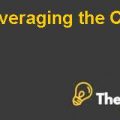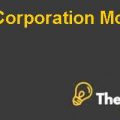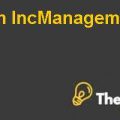
Determinants that affect working capital policies
a) Leverage
Highly geared companies are susceptible to pay high risk premiums, which indicates that firms have to suffer high cost of working capital, which will reduce the working capital of the company whereas, low geared companies have low cost of financing and increased cash will be available to the organization to fulfill their working capital requirements (Dong, 2010).
b) Growth opportunities
Theories find a negative co-relation between the cash conversion cycle and the sales growth because the organizations will be required to grant excessive credit period to the customers to pay, which will threaten the cash conversion cycle of the company and less cash will be available to the company to satisfy its working capital requirements.
c) Size of the organization
Size of the organization really affects the working capital requirements because the large company can easily raise finance to manage its working capital but that is not the case for smaller organizations where such organizations will be required to deposit some security in order to obtain an overdraft facility. Further, the interest rate charges on the small organizations are greater than the interest rate charged to big organization. Financial institutions charge a high interest rate as a compensation for bearing high risk (Eljelly, 2004).
d) Returns
It has been argued that the returns have a negative correlation with the Cash Conversion Cycle (CCC) because a rebuttable assumption has been taken that the company grants higher credit terms for increasing its sales and because customers have high market dominance and high bargaining power (Eljelly, 2004).
Benefits of effective working capital management
a) Improves liquidity and profitability
Effective working capital helps an organization in improving the liquidity position of the company. This can be achieved when the timely payments are being received from customers, inventories are readily convertible into cash and timely payments are made to the suppliers. All this practice will help an organization to strengthen its relations with their stakeholder, which will ultimately contribute towards generating future revenue.
b) Controls financial risk
One of the benefits of effective working capital management was that it effectively managed the financial risk. There might be a possibility that the creditors might not be paid on time that might result in penalties, so effective working capital management would enable an organization to make timely payments, hence avoiding any penalties or any other legal consequences (Eljelly, 2004).
c) Reduces finance cost
If the working capital is effectively being managed, i.e.; inventory is kept minimum, regular follow up to customers for promote payment and timely payment to suppliers are made then it will reduce the need for the company to avail any overdraft facility for managing its working capital, hence, substantially reducing the finance cost (Emery, 2004).
d) Chance to avail future potential opportunities
Effective management of working capital enables an organization to tie fewer amounts in working capital, which will left the reminder amount that can be invested in activities to generate higher returns. Further, it will also eliminate the need for the company to finance the potential opportunity through expensive means of financing.
e) Assist in maintaining goodwill
Effective working capital helps an organization in maintaining goodwill because when creditors are paid on time then it will strengthen relations with them, which can also benefit the organization as well, such as; they may offer low price or there can also be a possibility that they may offer high credit terms to the company. Further, effective manage also helps in managing solvency, which will benefit the organization in the long run (Eljelly, 2004).
Disadvantages of ineffective working capital management
a) Unnecessary purchasing
When the organization holds excessive cash then it invests in unnecessary items and accumulates the inventory over the required level, which increases the chance that the inventory may obsolete. Further, it also increases the inventory holding cost and security cost.
b) Higher chance of bad debts
Excessive debtors and ineffective credit collection policy may threaten the cash flows of the company and increase the chance of write off. It arises where the organization does not have strong credit policy and where the organization fails to continually follow up debtors. Further, there can also be a possibility that sufficient funds may get stuck to a single party, which increases the chances of write-off................................
This is just a sample partial case solution. Please place the order on the website to order your own originally done case solution.













